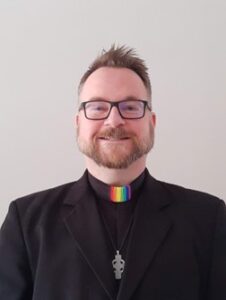The Twenty-Second Sunday after Pentecost Sunday (Proper 24), October 20, 2024
September 16, 2024 | by Tim Bowman
| Reading 1 | Reading 2 | Reading 3 | Reading 4 | Reading 1 Alt | Reading 2 Alt |
|---|---|---|---|---|---|
| Hebrews 5:1-10 |
The anonymous Letter to the Hebrews, so called because of its use of Jewish themes, addresses a religious community sometime in the late or very late First Century CE. They are under strain from unspecified causes, including persecutions, and the writer encourages them to stay true to their confession of Jesus as Christ and Son of God. The writer compares their audience to the Israelites of the Exodus, many of whom were denied the opportunity to “enter [God’s] rest” because of their disobedience. Therefore, the audience should approach God in faith, with confidence, because in Jesus Christ they have a sympathetic high priest who offers a sacrifice of atonement for them as on the Day of Atonement.
Today’s reading begins to unpack the idea of Jesus as high priest, explaining how he is a high priest and how that benefits us.
The most obvious objection (to a Jewish Christian audience) is that the high priest was drawn from the line of Aaron, whereas the Messiah was supposed to arise from the house of Judah. The writer appeals to two Psalms often given a Messianic referent in early Christianity: Psalm 27 (“You are my Son…”) and Psalm 110, which begins, ‘The Lord says to my lord, “Sit at my right hand until I make your enemies your footstool.” Our writer has quoted this earlier, in Chapter 1, but his innovation here is to quote from a later line: “You are a priest forever, according to the order of Melchizedek.” Melchizedek is the enigmatic king and “priest of God Most High” who met and blessed Abraham. Melchizedek was, of course, before Aaron and thus establishes a precedent for priests not associated with Aaron but chosen freely and directly by God. Similarly, Jesus did not choose himself for the Messianic role; it was conferred on him by God.
Most importantly, for the writer, the high priest was chosen from among the people, and could sympathize with the people as he prayed for them, being himself human and subject to all the temptations and hardships of human life. To be a high priest for us, Jesus therefore must be made perfect: he must also experience the fullness of human existence – even death. This would imply that Jesus is not fully human until the end of his life. Could it be that we also are still learning the full meaning of being human up and until and through our last breath? John Cobb has described not only Jesus but God as “the fellow sufferer who understands.” To understand fully, one must suffer (and surely also enjoy) life fully.
Jesus Christ may indeed tick all the boxes in the high priest job description, but how is this high priesthood of Jesus uniquely beneficial? The high priest offered the sacrifice of atonement once a year; the crucified, resurrected and ascended Christ is “at the right hand of God,” offering it continually. As the son of God he is “a priest forever,” continually relating us to God. This may be analogous to the Process idea that God is constantly offering us new possibilities for choosing life. Perhaps, indeed, it is impossible to truly offer a once-for-all atonement for sin because the God-human relationship is constantly evolving with each new choice taken. A final atonement would instead imply that there is nothing more to be said or explored in the God-human relationship.
A preacher searching for an illustration might perhaps consider Isaac Asimov’s novelette The Bicentennial Man, in which a robot, created as a servant to a human family, eventually buys his freedom. Seeking to truly understand what it means to be human, he has his robotic body modified to become increasingly organic. He goes to court for the right to take the final step: to introduce flaws into his positronic brain so that it will decay and finally fail. His campaign for the right to die captures worldwide attention and forces everyone to grapple with what it means to be truly human.
To be truly human is to be in close relationship with God, which is only possible through fully embracing human life – including death.
Tim Bowman is an Ordained Minister in the United Church of Canada, serving Gladwin Heights – St. Andrew’s Pastoral Charge in the Fraser Valley of British Columbia. He is currently a ThM student at the Vancouver School of Theology, focusing on Process Theology. Tim is a contributor to Preaching the Uncontrolling Love of God, Edited by Jeff Wells, Thomas Jay Oord, et. al., and lives in New Westminster with his wife, child, and two cats.

